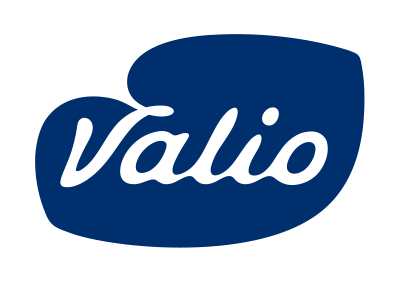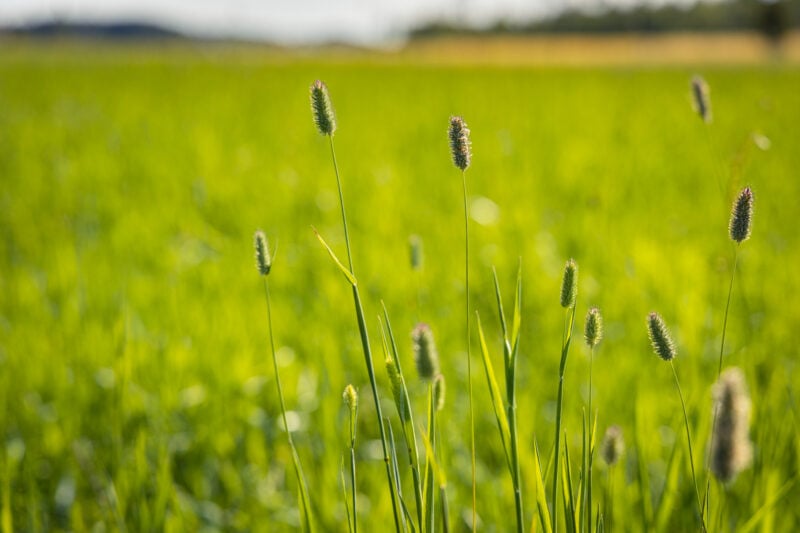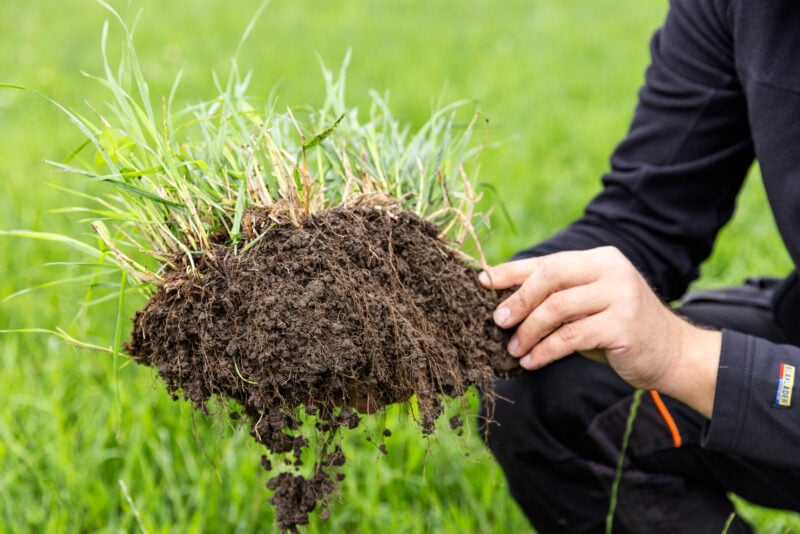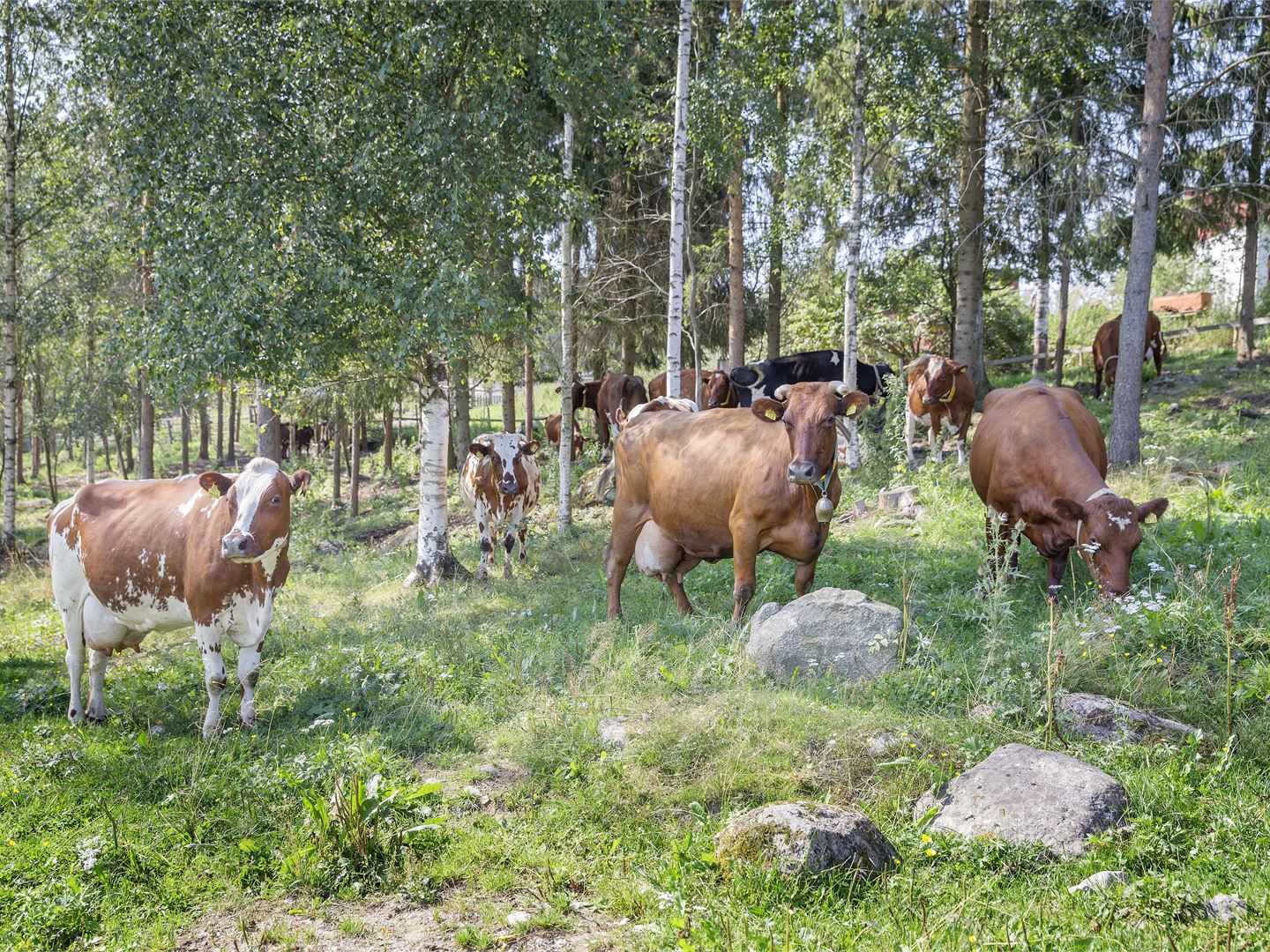
Valio’s Climate Programme
Valio’s ambitious climate programme consists of concrete actions to cut the carbon footprint of milk to zero by 2035. The challenge is not an easy one, because food production generates emissions that cannot be completely avoided. So, how to cut production chain emissions without offsetting them?
Our goal is to cut the climate impacts of Valio’s milk chain to zero by 2035. Carbon-neutral milk means that at least the same amount of emissions is reduced and removed from the atmosphere as is generated on dairy farms, in transportation, at plants, in the manufacturing of packaging and elsewhere along milk’s journey from the farm to the grocery store. Our work focuses on reducing emissions, not on offsetting them. Valio has set 2019 as the base year for its climate programme; that’s when the emissions calculation was standardised with the international Greenhouse Gas Protocol.
Greenhouse gas emissions from Valio’s operations in Finland in 2023 were about 2.16 million carbon dioxide equivalent tonnes. Raw milk received accounted for 80% of this, energy use at production plants 7% and logistics 2%. The rest of the emissions were related to raw materials used in product production, packaging, waste processing, energy in primary production, personnel travel, and product storage and handling at the grocery store and in consumer homes. In addition to these emissions, farm fields release and bind carbon dioxide, which we have taken into account in a separate carbon balance.
TOWARDS NET ZERO THROUGH RESEARCH AND COLLABORATION
Valio’s climate work is based on the latest domestic and international research data. We follow the recommendations of the Intergovernmental Panel on Climate Change (IPCC) and the Greenhouse Gas Protocol in assessing our climate impact.
In our climate programme, research data is converted into practical actions. We engage in close collaboration with actors in the agricultural, energy and environmental sectors and with various research institutes. Our partners include Natural Resources Institute Finland, Finnish Meteorological Institute, University of Eastern Finland, University of Helsinki, Yara, Atria Tuottajat, and Baltic Sea Action Group.
About 3,500 Finnish dairy farmers own Valio through regional cooperatives. Dairy farmers have a key role in our climate work, as the majority of milk’s carbon footprint is generated on farms. Valio offers financial support, science-based information and collaboration opportunities to support climate-friendly production methods. For example, our new sustainability programme taking effect in May 2023 offers farms financial incentives to reduce their carbon footprint.
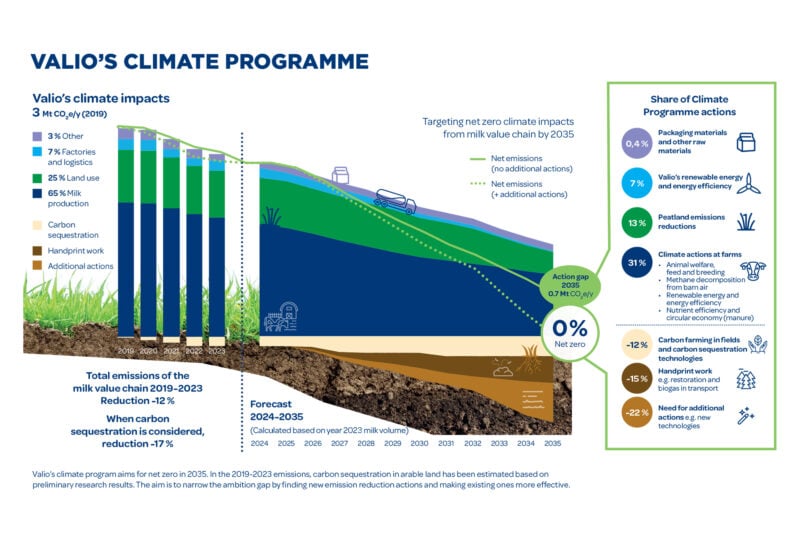
Tools we have developed
We actively support our dairy farmers in the reduction of emissions. We have developed Valio Carbo® Farm Calculator to help each farm measure the carbon footprint of their raw milk. The results of the individual farms are used to estimate the total carbon footprint of the milk received by Valio. The calculation model was developed by Valio and is based on IPCC (Intergovernmental Panel on Climate Change) recommendations. The model has been certified by the independent Carbon Trust organisation. In addition to the carbon footprint, the calculator is used to calculate acidification and eutrophication potential.
Below we have outlined the emissions reduction targets and what we are doing to get our milk carbon footprint to zero by 2035.
BOOSTING CARBON-SEQUESTERING GRASS CULTIVATION
Just like forests, grass also has the ability to sequester carbon from the atmosphere. More than a quarter of Finnish fields are grasslands. So how we cultivate them does make a difference.
Carbon sequestration of fields can be improved by e.g. increasing the variety of grass species, by increasing the mowing height, and by keeping fields green year-round. Carbon farming measures can also improve yields and the financial profitability of the farm.
What we are doing
- We are improving the carbon sequestration of mineral soil
- We are improving soil health
- We are boosting crop yields
- We are utilising legumes in farming
- We are using fertilisation methods that are less polluting
What we’ve achieved so far
- We have trained more than 1500 carbon farmers
- Over 1500 Valio dairy farms are practicing carbon farming on almost 130,000 hectares
- We are working in close collaboration with top research groups and companies specialising in grass cultivation and use
- We have developed Carbo® grass seed mix containing six different grass varieties that bind carbon and increase biodiversity
- We are encouraging dairy farmers to sequester carbon by paying them sustainability bonus. By taking climate actions, dairy farmers can earn more for the milk they produce.
Read more
REDUCING EMISSIONS FROM AGRICULTURAL PEATLANDS
About half of the greenhouse gases generated by Finland’s agriculture are from peatlands that were swamps or swamp forests drained over decades. Peatlands account for about 10% of Finland’s arable land. To achieve our target of a carbon-neutral milk chain, greenhouse gas emissions from agricultural peatlands must be significantly reduced.
Emissions from peatlands can be reduced with the right farming practices. It is vitally important that we can instruct and support milk producers in farming practices that are more climate-friendly. The most effective climate measure for low-yielding peatlands is restoration to wetlands.
What we are doing
- Keeping fields green year-round
- Cultivating perennial grass instead of annual crops
- Reducing soil tillage
- Raising groundwater levels
- Restoring low-yielding fields to wetlands and reforestation
What we’ve done so far
- We published recommendations for dairy farmers on peatland cultivation based on the latest research data
- We arranged a peatland-themed hackathon to find solutions to reduce peatland emissions
- We are involved in peatland research and development projects, such as Luke’s OMAIHKA, ARMI, RUUHI and VÄPÄ projects
- We are measuring greenhouse gas emissions from peatlands year-round at several Valio dairy farms
- In 2024, we will restore a low-yielding peat field on one of Valios’ organic dairy farm in into a wetland
Read more
RENEWABLE FUEL FROM MANURE TO REPLACE FOSSIL-BASED ENERGY SOURCES
Because of its fertilising impact, manure is a valuable raw material for dairy farms, but storing manure generates methane emissions. Methane emissions from stored manure can be reduced by capturing the methane in a biogas plant. Biogas that is refined into biogas for transport use not only reduces emissions in milk production, but also in transportation.
The production of industrial fertilisers used on farms generates carbon dioxide emissions. The industrial fertilisers used in farming can be reduced by processing the manure generated at dairy farms in a biogas plant and by using the nutrients from nutrient-rich processed manure in crop cultivation.
What we are doing
- We are replacing fossil-based transport fuels with manure-based biogas
- We are boosting national energy self-sufficiency
- We are reducing methane emissions from manure storage
- We are replacing crop fertilisers by improving the usability of manure nutrients
- We are reducing the use of peat bedding by producing animal bedding from manure
- We are exploring the possibility of using manure instead of peat as a raw material for commercial soil products
What we’ve done so far
- In 2021 Valio and the energy company St1 established Suomen Lantakaasu Ltd, a joint venture that aims to produce 25% of Finland’s biogas in 2030
- Currently, the joint venture has advanced project development for the development of a total of five biogas plants in Kiuruvesi, Lapinlahti, Sonkajärvi, Nurmes and Nurmo
- We were the first in the world to develop and patent a process to produce biogas, clean water, and phosphorus and nitrogen fertiliser fractions from manure
- Twenty Valio dairy farms are participating in biogas production
- Valio has six milk trucks powered by biogas, one of them is powered by manure-based biogas
Read more
ANIMAL WELFARE, FEEDING AND BREEDING
Cow health and welfare are not incompatible with our climate targets – on the contrary. A healthy and thriving cow generates significantly less greenhouse gases per milk litre. Grazing supports the welfare of cows and, at best, can increase the sequestration of carbon dioxide.
Proper feeding and breeding have a significant impact on milk’s carbon footprint. Finnish milk production is based on highly digestible grass forage, which is the natural diet of ruminants. Climate-smart breeding of dairy cattle promotes animal health and sustainability, as well as the production of high-protein and high-fat milk. Breeding can also impact a cow’s ability to use dietary energy efficiently, thereby requiring less feed without compromising animal welfare and production yield.
What we are doing
- We are promoting cow health and welfare by, e.g., paying a sustainability bonus
- We are piloting methane emissions-reducing feed
- We are promoting climate-friendly animal breeding
What we’ve done so far
- Methane emissions from milk production have decreased by 57% in 60 years
- All Valio milk producers have committed to actions that improve animal welfare and exceed statutory requirements
- Since 2010, Valio has actively participated in breeding research to improve dairy cattle feed efficiency
- We have piloted feed that reduces methane production on Valio farms in 2022 with 400 cows and in 2023 with 3,000 cows. In the spring of 2024, we launched the Valio Carbo™ partnership program, where feeding that reduces methane emissions is included as the first climate measure
- Valio has long supported feeding cows grass, which is species-appropriate nutrition and moderate in terms of carbon footprint. Grass cultivation can also bind carbon from the atmosphere into the soil
Read more
RENEWABLE ENERGY AND ENERGY EFFICIENCY
The energy system’s transition towards renewable and energy-efficient solutions is an essential part of Valio’s climate programme. We continuously invest in the energy efficiency of our factories, and we encourage our dairy farmers to embrace climate-smart energy solutions.
What we are doing
- We are improving energy-efficiency at dairy farms and factories and in our logistics
- We are increasing the use of renewable energy across our value chain
What we’ve done so far
- New bioenergy heating plant for the Turenki factory
- Heat recovery system for the Riihimäki factory
- Flue-gas condenser-heat pump system for the Lapinlahti factory
- We boosted and developed the operational efficiency of heat distribution and recovery networks
- Half of the heat used by Valio is renewable energy, and 20% of the electricity comes from wind power purchased with a guarantee of origin
- Valio supports dairy farms in organising the purchase of solar energy panels
Read more
NEW EMISSIONS REDUCTION TECHNOLOGIES
Valio has always been a technology-driven company, and a bold approach to new innovations is part of our strategy. To achieve our net-zero target, we need solutions that will take shape along the way to 2035. We are continuously exploring new opportunities to reduce emissions and sequester carbon dioxide from the atmosphere. We are piloting technologies and bringing new solutions to Finnish milk production.
What we are doing
- We are participating in two EU-funded, four-year research projects that are developing new technological solutions to remove methane from the air in cowsheds
- We are mapping opportunities to sequester, store and utilise carbon dioxide with new technologies
- We are making recycling more efficient
- We are reducing waste
What we’ve done so far
- We arranged a hackathon competition in 2018 to find solutions to capture and utilise methane emissions in cowsheds. We then continued investigatory work with VTT Technical Research Centre of Finland. As a result of the investigatory work, we are now participating in two international consortia to develop new technology solutions for the sector
- We are taking part in an R&D project that aims to promote a truly circular economy for packaging: Closed-loop recycling ecosystem for plastic packaging (SULKI). Our goal is that all our packaging truly aligns with a circular economy
- Our climate team is constantly monitoring global innovations and applying them to Valio

Valio’s emissions reductions
We are reducing our emissions in line with our climate roadmap. By 2022, Valio Finland’s total emissions had decreased by 10% from year 2019. Our climate targets are science-based.
